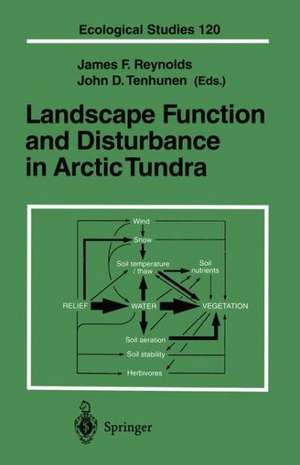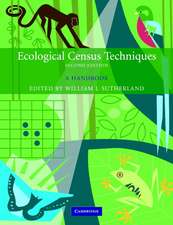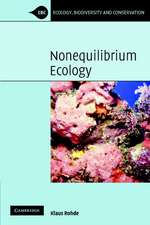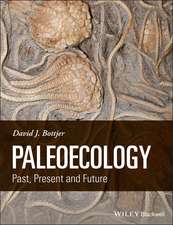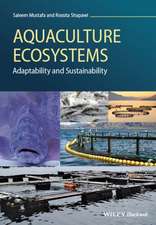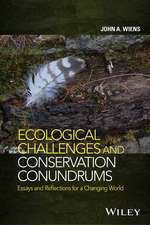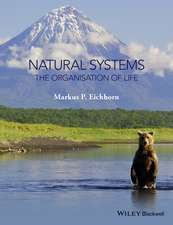Landscape Function and Disturbance in Arctic Tundra: Ecological Studies, cartea 120
Editat de James F. Reynolds, John D. Tenhunenen Limba Engleză Paperback – 5 sep 2012
It is an important resource for researchers and students interested in arctic ecology, as well as for environmental managers concerned with practical issues of disturbances.
Din seria Ecological Studies
- 18%
 Preț: 1118.93 lei
Preț: 1118.93 lei -
 Preț: 553.72 lei
Preț: 553.72 lei - 18%
 Preț: 1680.55 lei
Preț: 1680.55 lei - 18%
 Preț: 1003.38 lei
Preț: 1003.38 lei - 20%
 Preț: 1004.71 lei
Preț: 1004.71 lei -
 Preț: 480.62 lei
Preț: 480.62 lei - 5%
 Preț: 752.26 lei
Preț: 752.26 lei - 15%
 Preț: 643.99 lei
Preț: 643.99 lei - 15%
 Preț: 644.18 lei
Preț: 644.18 lei - 15%
 Preț: 652.49 lei
Preț: 652.49 lei - 18%
 Preț: 789.83 lei
Preț: 789.83 lei -
 Preț: 382.36 lei
Preț: 382.36 lei - 15%
 Preț: 643.48 lei
Preț: 643.48 lei - 15%
 Preț: 646.30 lei
Preț: 646.30 lei - 15%
 Preț: 634.32 lei
Preț: 634.32 lei -
 Preț: 384.86 lei
Preț: 384.86 lei - 18%
 Preț: 789.98 lei
Preț: 789.98 lei - 15%
 Preț: 645.14 lei
Preț: 645.14 lei - 15%
 Preț: 649.39 lei
Preț: 649.39 lei - 18%
 Preț: 1005.43 lei
Preț: 1005.43 lei - 18%
 Preț: 949.23 lei
Preț: 949.23 lei - 15%
 Preț: 649.54 lei
Preț: 649.54 lei - 15%
 Preț: 643.34 lei
Preț: 643.34 lei - 15%
 Preț: 649.71 lei
Preț: 649.71 lei - 15%
 Preț: 638.76 lei
Preț: 638.76 lei - 18%
 Preț: 957.62 lei
Preț: 957.62 lei - 18%
 Preț: 1235.25 lei
Preț: 1235.25 lei - 18%
 Preț: 962.18 lei
Preț: 962.18 lei - 18%
 Preț: 949.23 lei
Preț: 949.23 lei - 15%
 Preț: 660.68 lei
Preț: 660.68 lei - 15%
 Preț: 638.24 lei
Preț: 638.24 lei - 18%
 Preț: 942.31 lei
Preț: 942.31 lei - 18%
 Preț: 1232.57 lei
Preț: 1232.57 lei - 15%
 Preț: 651.34 lei
Preț: 651.34 lei - 18%
 Preț: 952.72 lei
Preț: 952.72 lei - 18%
 Preț: 1834.27 lei
Preț: 1834.27 lei - 18%
 Preț: 1229.10 lei
Preț: 1229.10 lei -
 Preț: 423.95 lei
Preț: 423.95 lei - 18%
 Preț: 948.92 lei
Preț: 948.92 lei
Preț: 397.76 lei
Nou
Puncte Express: 597
Preț estimativ în valută:
76.12€ • 79.18$ • 62.84£
76.12€ • 79.18$ • 62.84£
Carte tipărită la comandă
Livrare economică 14-28 aprilie
Preluare comenzi: 021 569.72.76
Specificații
ISBN-13: 9783662011478
ISBN-10: 3662011476
Pagini: 464
Ilustrații: XX, 440 p.
Dimensiuni: 155 x 235 x 24 mm
Greutate: 0.64 kg
Ediția:Softcover reprint of the original 1st ed. 1996
Editura: Springer Berlin, Heidelberg
Colecția Springer
Seria Ecological Studies
Locul publicării:Berlin, Heidelberg, Germany
ISBN-10: 3662011476
Pagini: 464
Ilustrații: XX, 440 p.
Dimensiuni: 155 x 235 x 24 mm
Greutate: 0.64 kg
Ediția:Softcover reprint of the original 1st ed. 1996
Editura: Springer Berlin, Heidelberg
Colecția Springer
Seria Ecological Studies
Locul publicării:Berlin, Heidelberg, Germany
Public țintă
ResearchCuprins
I Introduction.- 1 Ecosystem Response, Resistance, Resilience, and Recovery in Arctic Landscapes: Introduction.- 2 Integrated Ecosystem Research in Northern Alaska, 1947–1994.- 3 Disturbance and Recovery of Arctic Alaskan Vegetation.- 4 Terrain and Vegetation of the Imnavait Creek Watershed.- 5 Vegetation Structure and Aboveground Carbon and Nutrient Pools in the Imnavait Creek Watershed.- II Physical Environment, Hydrology, and Transport.- 6 Energy Balance and Hydrological Processes in an Arctic Watershed.- 7 Shortwave Reflectance Properties of Arctic Tundra Landscapes.- 8 Isotopic Tracers for Investigating Hydrological Processes.- III Nutrient and Carbon Fluxes.- 9 Surface Water Chemistry and Hydrology of a Small Arctic Drainage Basin.- 10 Nutrient Availability and Uptake by Tundra Plants.- 11 Landscape Patterns of Carbon Dioxide Exchange in Tundra Ecosytems.- 12 Control of Tundra Methane Emission by Microbial Oxidation.- 13 Dynamics of Dissolved and Particulate Carbon in an Arctic Stream.- IV Modeling Landscape Function.- 14. Patch and Landscape Models of Arctic Tundra: Potentials and Limitations.- 15 Modeling Dry Deposition of Dust Along the Dalton Highway.- 16 Modeling Decomposition in Arctic Ecosystems.- 17 Hydrological Controls on Ecosystem Gas Exchange in an Arctic Landscape.- 18 Road-Related Disturbances in an Arctic Watershed: Analyses by a Spatially Explicit Model of Vegetation and Ecosystem Processes.- V Summary.- 19 Ecosystem Response, Resistance, Resilience, and Recovery in Arctic Landscapes: Progress and Prospects.
Recenzii
"..a very important contribution to arctic ecology...The book will soon be a classic and is indispensable for everyone interested in the ecology of the Arctic tundra." Entomologia Generalis
Textul de pe ultima copertă
The discovery of large petroleum reserves in northern Alaska prompted the US National Research Council to recommend priorities for ecological research on disturbance effects in the Arctic. Subsequently, this led to the implementation of a field study by the Department of Energy, based in a small watershed on the North Slope of Alaska. This volume describes results by a research team charged with seeking answers to a number of questions related to disturbance in tundra regions: Will short-term disturbances have long-term ecological consequences? Will localized effects be transferred to adjacent systems, e.g., from terrestrial to aquatic? Is it possible to extrapolate understanding of impacts from one landscape to another? The results reported in this volume are an important contribution towards the goal of implementing ecosystem-based management in arctic tundra landscapes.
Landscape Function and Disturbance in Arctic Tundra covers a broad array of topics, from ecosystem physiology to landscape modeling. It is an important resource for researchers and students interested in arctic ecology, as well as for environmental managers concerned with practical issues of disturbance.
Landscape Function and Disturbance in Arctic Tundra covers a broad array of topics, from ecosystem physiology to landscape modeling. It is an important resource for researchers and students interested in arctic ecology, as well as for environmental managers concerned with practical issues of disturbance.
